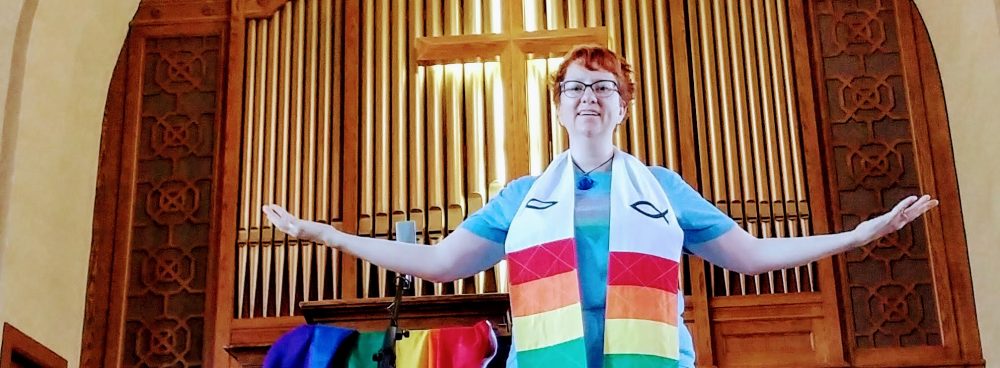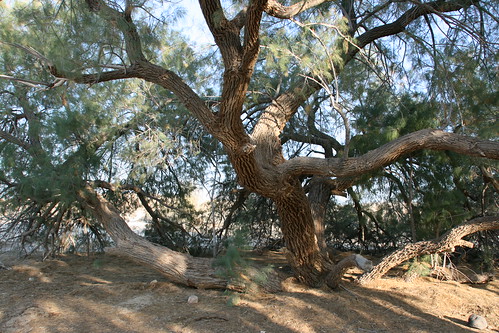Genesis 18:1-15, 21:1-7 tells the story of God’s promise to Sarah and Abraham and the birth of Isaac, the expected and unexpected child.
Imagine you are travelling through the desert. There were no hotels, gas stations, or restaurants. Just sand as far as the eye can see. Through the bright glare of the sun, you glimpse something. Maybe it’s nothing but you adjust your direction a bit. As you get closer, you realize it’s an oasis. Water, a grove of trees, several tents. While you are still walking, someone notices you and gets up and runs towards you. He bows to you and your companions and introduces himself as Abraham.
Abraham invites you to come and sit under a tree. The tree is ancient and gnarled. It branches spread wide creating a large area of shade. You gratefully rest under the canopy of that tree. Abraham brings water and washes the sand and dust from your feet as you lie back and relax. It’s much cooler in the shade and the water Abraham brought is so refreshing. You lay back and go to sleep.
Several hours later, you awake to the smell of roasting meat and baking bread. Abraham approaches with meat, cheese and bread. He brings you wine to quench your thirst.
Abraham is good at hospitality. He knows how to make guests feel comfortable and welcome. He knows how to fill their bellies with food and drink. Abraham’s hospitality is repaid with the reiteration of a promise made 35 years before—Abraham and Sarah will have a child. You can imagine being promised a child and then waiting 35 years. The fulfilment of that promise in their old age is unlikely at best. It’s no wonder Sarah laughed dismissively.
And yet sitting under this old, gnarled tree, anything is possible. Rabbi Chananel who lived between 980-1055C.E. “asked why the angels revealed themselves to Abraham under a tree. He answered that in doing so they revealed a message to Abraham: “You, like a tree, will flourish even in your old age.” As it says in the Book of Job, “For a tree has hope; if it is cut it will again renew itself, and its trunk will never cease.” In the words of the Psalmist, “You shall be planted as a tree planted beside streams of water, which brings forth its fruit in its season. Its leaves do not wilt, and whatever it does prospers. Abraham’s resilience and prosperity are compared to a tree.” (EcoBible)
The angels remind Abraham as he serves them under the tree’s canopy that God’s promises are long-term and sometimes unexpected. Even when possibilities are limited, hope can be renewed. There’s this lovely sense of longevity in this image. It is strong and firm and rooted. This is an image filled with possibilities and hope. We can learn from the trees about long-term waiting. In our climate, trees have seasons. Deciduous trees are particularly noticeable. We wait every spring for the leaves to come out. We enjoy the shade they provide in the heat of summer. We find joy in the colours of fall. And then in winter, trees take a break from the work of growth so they can be nourished and replenished. There is something hopeful about this cycle. Even when the tree drops its leaves, we trust that in the spring it will be renewed with life.
But what happens when trees start dying unexpectedly in large numbers? When I talked to my dad last week, he told me that trees around the farmyard where I grew up are dying from drought. These are trees that have lived through my whole lifetime and most of his lifetime. While trees are resilient, there comes a point where they can no longer withstand drought. We watched a larger-than-normal number of trees burn this summer. Invasive tree-killing insects are also spreading because of warmer climates. Even the resilient trees are being threatened because of climate change. Is climate change also killing our hope and sense of resilience?
Finding that sense of long-term hope can be very challenging. What we see before us can be overwhelming and all-encompassing. We might think that all the possibilities exist in our small view. Part of the story we didn’t hear this morning follows Hagar and her son Ishmael. Hagar was Sarah’s slave. When Sarah couldn’t get pregnant, she offered Hagar to Abraham and Ishmael was born. That was fine, but once Isaac was born, Sarah became jealous and forced Hagar and Ishmael to leave the camp. Hospitality was not shown to Hagar and Ishmael as they were left to fend for themselves in the desert. But even as they waited to die from heat exhaustion and dehydration in the desert, God appeared. Hagar was shown a well and they both survived and thrived. Again, there is an unexpected hope and promise beyond what could be imagined.
Between climate change, hatred, and the rise of Christian nationalism it can be challenging to find hope and to hang onto a long-term hope. It can be hard not to hold onto the despair that we see in the world. It is hard not to become infected by the hatred that we feel around us. And yet we are called to be people of hope—just like Abraham and Sarah and Hagar and Ishmael.
What we see in our immediate vision, isn’t all that exists. We see limited possibilities based on what we already know or what our experience tells us. But we need to be open to surprises. And we have a God who is full of surprises—Abraham and Sarah having a baby in their old age or Hagar finding a well in the desert just before she dies. Surprises might be a sign of hope for us.
We need to pay attention to the messengers around us. Some translations talk about the travellers in this story as angels. In Hebrew, angels are messengers from God. They are not necessarily otherworldly. Angels can be anyone created by God. Angels are strangers or friends. Angels come as modern-day prophets. Angels are trees or other creatures. When we pay attention to the messengers God places in our lives and really listen to what the angels say, we might be surprised at the hope we find. And we need to be prepared for surprises—like an unexpected ally, or someone who is open to being changed.
A promise on its own doesn’t necessarily create hope. When Sarah hears the news that she will have a baby within the year and that that child will parent many nations, she laughs derisively. She scoffs. And yet that’s exactly what happened. Imagine Sarah’s hope when she realized she was pregnant. For Sarah that unexpected pregnancy might have been the moment she began to have hope in the future. That might have been the moment Sarah and Abraham began to believe that the promise of a nation of descendants might be a reality.
Hope isn’t just wishing. Hope is grounded in the present reality and looking to the future. So when I think about climate change, I see the destruction that exists. I see tiny changes that myself and others are making. I see climate accords being signed which then gives the ability to hold governments accountable. When I see the hate around us, I also see people standing firm and challenging the hate. I see people working hard to create safer spaces, to work at creating welcome for all people. All these things are signs of hope. Without seeing these glimmers, it is easy to lose hope. Our own work in these areas might be the thing someone else needs to find their hope and be empowered. Each time someone finds hope, the promise of the flourishing of God’s creation extends a little further. And so we hope for a world made new.



